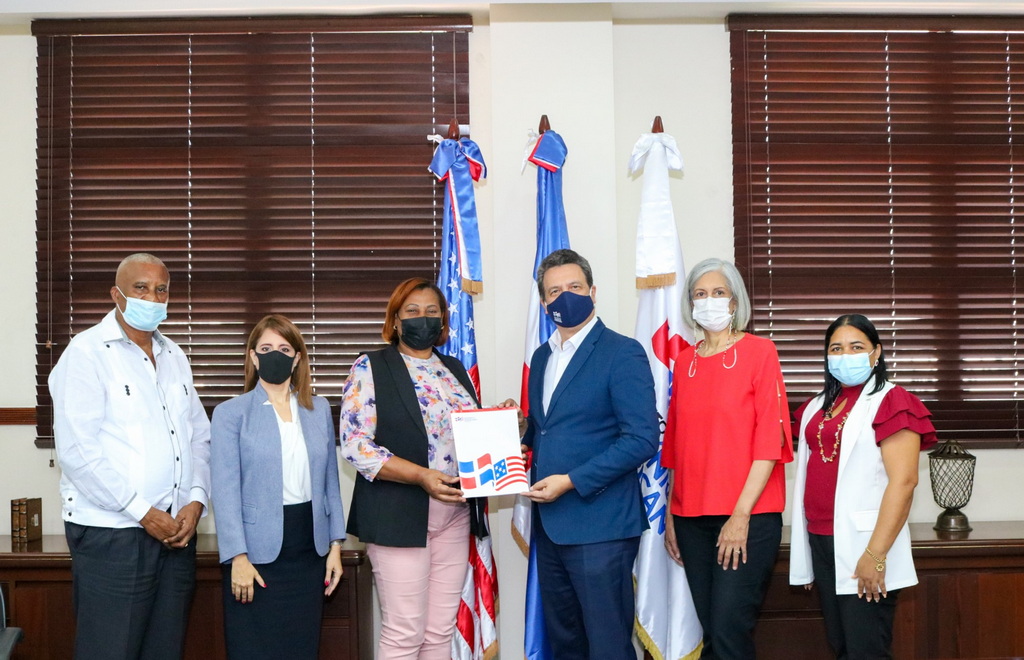
Santo Domingo. -The director of Regional 10-Santo Domingo, teacher Teodosia Otaño, received a donation of 250 scholarships from Universidad Domínico Americano (UNICDA) aimed at the education and training of 250 teachers in key areas such as digitalization and technology in the national education system.
The initiative to support technological digitalization in Dominican education is part of an ongoing agreement between the Ministry of Education (MINERD), the United Nations Development Program (UNDP) and the Dominican Association of University Rectors (ADRU).
The scholarships will be distributed among the teachers of Regional 10-Santo Domingo educational districts 10-01 and 10-02, which will allow them to access different courses on digital education, technology and other fundamental tools for the improvement of the quality of education.
This is a series of courses of 12 to 20 hours duration offered by the Teacher Development Center (TDC), which seeks to train teachers for a better knowledge, understanding, and skills of the teaching-learning process within the technological revolution that the world is experiencing.
During the ceremony, Ramón Sosa, rector of the university, stated that the courses will be taught by national and international facilitators, in key areas such as digital education, computers for adults, as well as the tools to face the challenge of hybrid and distance contexts.
He said that the scholarships for specialized training will be aimed at teachers who teach English and distance language teaching, “as we are committed to adding value to their continuing education and with the professional development of teachers in this Regional 10-Santo Domingo.”
Patricia Portela, Coordinator of the Social Cohesion component of the Project to Support the Digitalization of Education in the Dominican Republic, highlighted the work of the UNICDA management team and welcomed the initiative to support teachers with these scholarships. She also emphasized that this is the only contribution of such magnitude that they have received in the process of the project, which has been active for about 8 months. She reaffirmed the commitment to continue supporting the education of Dominicans and to keep contributing to the joining of forcesto achieve it.
Otaño welcomes the initiative
For her part, the teacher Teodosia Otaño thanked Universidad Domínico Americano for the donation of the scholarships, “and I do it in its rightful dimension for the valuable contribution it will make to our teachers in Regional 10 and to the entire educational system”.
She explained that “the era of technology and digitalization is a global reality that our education requires to achieve the goal of improving the teaching-learning process, a task in which we will not rest together with our Minister of Education, Roberto Furcal”.
The training courses to be held starting November 22 are:
Computer for Adults, Didactic Strategies for Collaborative and Interactive Distance Learning; Introduction to Digital Education (in the asynchronous modality); Neuroscience and Learning, and Hybrid Education as a Learning Model.
Also, Technology and Education in the Knowledge Society; Evaluation: A Key Part in the Teaching-Learning Process, and Creative Ways to Teach English Remotely (taught in English).
The activity, held in the “Engracia Franjul de Abate” meeting room, was also attended by Thelma Camarena, academic vice-rector of UNICDA; Karlans Camacho, coordinator of Continuing Education and the Teacher Development Center; Koral Nuñez, coordinator of Educational Innovation; Faustino Santana, director of Educational District 10-01 and María Hernández, from 10-02, among other personalities.
The courses
These trainings have synchronous or face-to-face components and asynchronous contents. Their main goal is to provide participants with opportunities for relevant learning experiences that help reinforce the skills needed in the educational field.
The focus of the topics is on the return to the classroom with the incorporation of virtual, hybrid and face-to-face elements, in addition to support the digitalization of teaching and/or processes.

